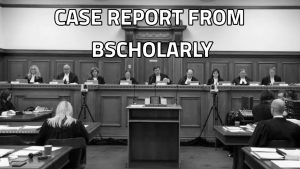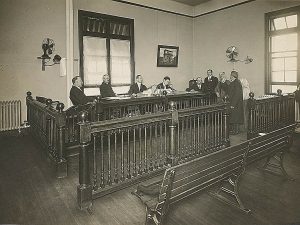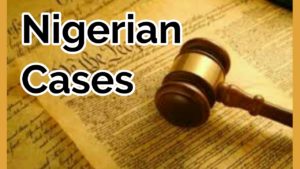Oyewunmi V Ogunesan (1990) 3 NWLR (PT 137) 187: This case restated certain principles of law. One is that in observing the principle of stare decisis, cases must be well distinguished. Thus, the courts are bound by precedence only when the issue in a case relied on and the instant one is in pari materia.

Another principle restated is that a custom which has not been judicially recognized can specifically be proved as facts. Another principle is that the court will readily fall back to acts of ownership in determination of title to the land.
Recommended: Facts, Issues and decision of the court in Mojekwu v Mojekwu
Issues raised in Oyewunmi V Ogunesan
Proof of the existence of a native law and custom where all lands is as a custom alleged to be vested on the traditional ruler.
Also see: Most Lawless countries in the world 2022
Fact Summary of Oyewunmi V Ogunesan (1990) 3 NWLR (PT 137) 187
In this case, the 1st defendant was the niece of the 2nd defendant. The 2nd defendant was the traditional ruler of Ogbomosho in Oyo State, bearing the royal title, The Shoun of Ogbomosho. The 2nd defendant had according to him, made a grant of some portions of land to his niece, the 1st defendant. This was the land on dispute. The 2nd defendant contended that under the Ogbomosho customary law, the Shoun of Ogbomosho has all the lands in the community vested in him to hold in trust, apart from the lands which has been transferred by him or the past Ogbomosho traditional rulers to another person and that subsequent Shoun cannot revoke a grant made by the formers.

It was on this basis that the 2nd defendant being the traditional ruler of Ogbomosho at the relevant time, made a free grant of land to his niece, the 1st defendant. The grant was evidenced in a written paper. It was this same land that the plaintiff laid claims that it belonged to him. He consequently instituted an action in the High Court, Oyo State claiming damages for trespass. The 1st defendant counterclaimed on the ground that she was the one entitled to a statutory right of occupancy in respect of the land. As was established in evidence, the plaintiff had acquired his title from one Layode’s family. It was after the plaintiff had deposited sand and stones on the land that he was invited by the 2nd defendant.
Recommended: How to become a successful Lawyer
The 2nd defendant asked the plaintiff to collect his purchase money back from the vendor and pay him, for it is only the Shoun of Ogbomosho that can validly transfer lands. Upon the plaintiff’s refusal to comply, the defendants sent their agents and servants to demolish structures on the said land. The plaintiff’s wooden fence, survey pillars, stones and sand were removed. The 1st defendant then started dragging possession of the land. The defendants relied on the Supreme Court’s case of Samuel Ajao V Ikolaba to contend that their custom has been judicially recognized. The trial court held in favour of the plaintiff. Further appeals were made up to the Supreme Court.

Recommended: The major principles of natural justice explained
Decision of the court in Oyewunmi V Ogunesan (1990) 3 NWLR (PT 137) 187
In determining the case, the trial court examined the alleged Ogbomosho custom in issue. The trial court considered the authorities cited by the defendants which for the court, does not establish their case. The court noted that a custom will be judicially recognized if it is a notorious one. The alleged Ogbomosho custom of vesting all lands in the community in the traditional ruler was a custom which has not been consistently followed. In fact, the custom became heard of during the time of the 2nd defendant as the traditional ruler.

The custom according to the trial court did not pass the acceptability test in the said community. The alleged custom was not known to the history of Ogbomosho. It was based on these facts that the trial court based its finding, holding in favour of the plaintiff that the defendants holds no valid title to the land in dispute and as such, could not have possibly made a valid transfer of same to the 1st defendant. The trial court noted the Nemo dat quod non habeat rule; once cannot give what he does not have. The above ruling found the counterclaim of the 2nd defendant incompetent.
On the plaintiff’s claim, the trial court held that the plaintiff successfully established a better title to the land in dispute. The plaintiff’s evidence of long possession and valid acquisition of the land under the native law was satisfactory. On the side of the defendants, the court noted that custom when not judicially recognized must be proved as fact as provided in the Evidence Act. The defendants failed to prove the existence of the alleged custom.
Recommended: Salary of Lawyers in Nigeria 2022
They relied on Ajao’s case which was not in pari materia with the issue in the instant case. The witness called by the 2nd defendant gave evidence to the contrary of the alleged existing custom, and the 2nd defendant could not bring the chiefs of the village to prove the existence of the alleged custom. The plaintiff adduced oral and documentary evidence showing that people of the village has been selling lands, thereby discrediting the defendants’ position of the existence of the alleged custom. The trial court holding the favour of the plaintiff awarded damages for trespass against the defendants together with a perpetual injunction restraining the defendants from further interference with the land.
Being dissatisfied, the defendants lodged an appeal to the Court of Appeal. The Court of Appeal unanimously dismissed the appeal, upheld the decision of the trial court, and awarded consequential cost against the defendants/appellants. The defendants/appellants being dissatisfied went a step further to the Supreme Court.
The Supreme Court upholding the decisions of the courts below held that the grantor though which the plaintiff obtained his title to the land had validly alienated the land which he had a valid title in respect of. The Supreme Court reviewed the oral and documentary evidence proffered at the trial court and upheld the discountenance that the Shoun of Ogbomosho has all the lands in the community vested in him, and that he alone can validly alienate same.
On the issue of judicial notice of custom, the Supreme Court desisted from emphasizing on it as it bears less significance. Recall that the defendants relied on the case of Ajao V Ikolaba to contend that the custom in issue has been judicially recognized. There was however a distinguishing factor between the case and the instant one.
Also see: Advantages and Disadvantages of Being Intelligent
In Ajao’s case as was relied one, there was no contention as to the ownership of land by the Shoun, therefore the issue of Ogbomosho customary law was not in question for determination, rather what was in question was whether the agent of the then Shoun of Ogbomosho can claim a land given by his ancestors to the defendant’s ancestors.
On the issue of acts of possession, the Supreme Court also upheld the decision of the lower courts in favour of the plaintiff. The trial court was justified in relying on the acts of ownership to arrive at its decision. The appeal was wholly dismissed with cost.

Edeh Samuel Chukwuemeka, ACMC, is a lawyer and a certified mediator/conciliator in Nigeria. He is also a developer with knowledge in various programming languages. Samuel is determined to leverage his skills in technology, SEO, and legal practice to revolutionize the legal profession worldwide by creating web and mobile applications that simplify legal research. Sam is also passionate about educating and providing valuable information to people.